Stephen Hayes's Blog
October 2, 2025
Secret of the Night Ponies (book review)
 Secret of the Night Ponies by Joan Hiatt Harlow
Secret of the Night Ponies by Joan Hiatt HarlowMy rating: 5 of 5 stars
A historical novel set in Newfoundland, Canada in 1965, when people were being encouraged to move off smaller islands and live on the main island, where it was easier for the government to provide infrastructure and services like schools, hospitals, etc. Many ponies were left abandoned on the small islands, where they sometimes starved in winter. Thirteen-year-old Jessie Wheller had taken her own pony to the mainland, but then learned of the fate of some of the others, and urged her friends to join her in doing something about it.
Young Jessie actually has three rescue adventures in the story, first of some people whose boat is wrecked in a storm, then of a younger school friend who is abused by her foster parents. This seems to cram too many adventures into too short a time, but it's fiction, and people who have adventures in fiction usually have more than in real life. Also, her participation in the earlier rescues gives Jessie the confidence that leads her to believe that she and her friends can rescue a whole herd of ponies.
Because of the setting and the age of the main characters I found it rather similar to Anne of Green Gables, and readers who enjoyed the stories of L.M. Montgomery will probably enjoy this one too. It is an exciting adventure story, well told, and gives an interesting glimpse into place and period.
View all my reviews
September 15, 2025
Speaking ill of the dead
What did your pastor preach on today?
That was a post I saw yesterday on exTwitter.
 I was the one who preached yesterday in our small congregation in Atteridgeville. Since we use the old calendar, I preached on St Simeon the Stylite and the Ecclesiastical New Year, remarking that in our part of the world it coincides with spring, and that is appropriate for the beginnings of things.
I was the one who preached yesterday in our small congregation in Atteridgeville. Since we use the old calendar, I preached on St Simeon the Stylite and the Ecclesiastical New Year, remarking that in our part of the world it coincides with spring, and that is appropriate for the beginnings of things. On the way home after the service we stopped to take photos of the camel's foot trees in bloom, which is always one of the first signs of spring in our part of the world.
Out of curiosity I looked at the comments on the exTwitter post, and found that almost every one of them was about whether the preacher in their church preached on, or mentioned Charlie Kirk. Some of them said that they were never going back to that church because the preacher had not preached on Charlie Kirk.
Until last week I had never heard of Charlie Kirk. The first I heard of him was a bunch of angry posts on social media saying that he was a terrible person who said terrible things and deserved to die.
So that was the first thing I learned about Charlie Kirk: that a lot of people didn't like him, and didn't like the things he said, and thought he deserved to die.
After reading a bunch of posts in this vein I came a couple of others that said he was a fine upstanding young man and that he didn't deserve to die.
So there were the second, third and fourth things I learned about Charlie Kirk: that some people admired him, that he was young, and that he was dead.
And then more messages appeared about his wife and children, and the manner of his death, and so on.
Now Charlie Kirk wasn't the only one to die last week. He wasn't even the only one to die violently. In the same week we had heard about 11 people who died violently on a boat in the Caribbean, shot by the US Navy. And some people had been killed in Ukraine, and some in Gaza, and some in Qatar who were trying to make peace. But none of these others were of any interest to the Twittering classes. Their names, their ages, their opinions, their families, were of no interest to the news media or the Twittering classes. The only one that interested them was Charlie Kirk.
Then I started seeing all sorts of opinions about Charlie Kirk from people who knew no more of Charlie Kirk than I did. I began to get a sense of pressure from social media, that one ought to have an opinion on Charlie Kirk. One ought to be able to say whether he was in heaven or hell. I felt a bit uncomfortable about that; after all, "vengeance is mine says the Lord, I will repay" (Romans 12:19).
If, as some people were saying, Charlie Kirk had said some bad things, then, without judging him as a person, one could at least comment on the things he said. But what did he say?
People who knew him, who had listened to what he had said or read what he had written, might be able to form a judgement. But I hadn't heard him speak or read what he had written. All I had on social media was third-hand or even more remote -- people who had heard someone else say that he had said something. That's hearsay, not evidence on which one can make a judgement.
I suppose I could do some research. I could search the web for a speech, writing, utterance or statement he had made, study it and then embark on a critique of his views, opinions or character. I could search for evidence of his actions. But why bother?
Perhaps one should bother because a lot of people seem to think it is important to have an opinion about Charlie Kirk. But is it really? I think it is no more important to have an opinion about Charlie Kirk than it is about the 11 people who died on a boat in the Caribbean. I think that Charlie Kirk no more deserved to die than they did.
One of the problems of the world, or perhaps one of the things that exacerbates the problems of the world, is this rush to judgement. The perceived need to identify the "good guys" and the "bad guys" in any conflict, what Americans call the "black hats" and the "white hats" (from the old Western movies of the 1930s and 1940s). And social media tend to exaggerate this tendency. It seems that their algorithms are even designed to do so.
As a result, in the conflicts of today there are no good actions or bad actions, only good people and bad people. Genocide is bad if the bad people do it, but good if the good guys do it. Terrorism is bad if the bad guys do it, but good if the good guys do it. As a result the needle of the world's moral compass swings about wildly. An act by those we designate as bad guys is an outrage, and the needle points north. The same act by those we designate as good guys is a brilliant strategic move, and the needle swings around and points south.
For Christians, at least, one way to steady the moral compass is to remember the adage Love the sinner, hate the sin. But I've said more about that here.
September 10, 2025
Goodbye to Zoom?
For the last couple of months ominous notes have appeared on my computer whenever I've used the Zoom conferencing app, telling me that Zoom will no longer be supported on my computer after December 2025, and saying I could learn more on their web site. So I went to their web site where I read:
In November 2025, Zoom plans to release the final version of the Zoom Workplace app for Windows 32-bit. The anticipated version number of the final release for Windows 32-bit is the last minor release of 6.6.0. Anyone who is still using a device running on a 32-bit version of Windows must prioritize upgrading to 64-bit.
Well, no, I will not prioritize downgrading to 64-bit with its reduced functionality. The reason I bought a computer running 32-bit Windows is that the 64-bit version will not run several programs that I use every day. The 32-bit version of Windows has this functionality, the 64-bit version lacks it. I use Zoom roughly once a fortnight. So if I am forced to choose between programs I run every day and one that I run once a fortnight, I know what I'll prioritise.
The Zoom page doesn't say that the 32-bit version will stop working after December 2025, it just says that that will be the date on which the last update of the 32-bit version will be released, so I hope it will go on working for some time after that. But I suppose sooner or later someone will introduce something that breaks it, and then it is likely to stop working.
But I think email mailing lists will still work, and I think they is one of the best means of group communication, and long may it continue. If you'd like to keep in touch by that means, come and join us in the Offtopic forum, where stuff that is off-topic in more specialised online forums may be freely discussed. To learn more, click here!
September 5, 2025
A Literary Mystery
Now here is a literary mystery that puzzles me, and if you are reading this I hope you might try to help me solve it, especially if you enjoy reading books and use the GoodReads web site.
I've written four novels, three for children and one for adults, and some people who've read them have written reviews and posted them on the GoodReads web site. If a book on the GoodReads web site gets ten or more ratings (books are rated with from one to five stars), it gets a list of other books attached -- "readers who enjoyed this book also enjoyed".
I was hoping to see such lists for my books, partly because I thought that if people who enjoyed my books liked them, I might like them too. And also because, knowing what readers of my books liked could help me to know what kind of books I should write in future. So I was very pleased when one of my books, The Enchanted Grove, got the required 10 ratings and I could see what other books its readers liked.
But the result was weird:
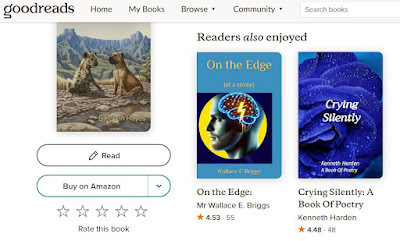 I can't imagine any readers of my books liking those two books, which I've never heard of. So if you've read The Enchanted Grove, or any others of my books, and rated them on GoodReads, please let me know if you're read either of those two. Also, if you've read any of my books and have not rated them on GoodReads I'd be very grateful if you would rate them, and better still, write a review, and check to see if any of your favourite books appear on this list. What I think may have happened is this: I got a couple of spammy emails from people asking for a link to my book. I gave them a link, and then a couple of reviews appeared. Both were filled with fulsome praise for the book which I was pretty sure were written by AI, and that the people who had posted these reviews had not read the book at all. It looks like some kind of scam to get the two books shown above listed on my book's page as a means of promoting them. The implication is that most of the readers of The Enchanted Grove had those two books as their favourites, which I find very hard to believe. If you haven't read The Enchanted Grove, and would like to, you can find out more about it, including where to get a copy, here.
I can't imagine any readers of my books liking those two books, which I've never heard of. So if you've read The Enchanted Grove, or any others of my books, and rated them on GoodReads, please let me know if you're read either of those two. Also, if you've read any of my books and have not rated them on GoodReads I'd be very grateful if you would rate them, and better still, write a review, and check to see if any of your favourite books appear on this list. What I think may have happened is this: I got a couple of spammy emails from people asking for a link to my book. I gave them a link, and then a couple of reviews appeared. Both were filled with fulsome praise for the book which I was pretty sure were written by AI, and that the people who had posted these reviews had not read the book at all. It looks like some kind of scam to get the two books shown above listed on my book's page as a means of promoting them. The implication is that most of the readers of The Enchanted Grove had those two books as their favourites, which I find very hard to believe. If you haven't read The Enchanted Grove, and would like to, you can find out more about it, including where to get a copy, here.
August 22, 2025
Burying the Typewriter: under the Eye of the Secret Police

Burying the Typewriter: Childhood Under the Eye of the Secret Police by Carmen Bugan
My rating: 4 of 5 stars
A memoir of a family living under the eye of the Romanian secret police in the time of the dictator Nicolae Ceaușescu.
Carmen Bugan's father was a political activist, protesting against the dictatorial communist regime in Romania, and was imprisoned as a result of his protests. During his imprisonment his family was under constant surveillance by the Romanian secret police, the Securitate, and Carmen Bugan describes the life of their family in those circumstances. When her father was eventually released from prison he wanted to leave Romania and the family emigrated to the USA shortly before the fall of Ceausescu.
The story is well told - Carmen Bugan is a poet, and many of her descriptions are poetic -- and I found it well worth reading.
It may be just me, but one of the things that I found most interesting was comparing her experience with the Romanian Securitate and my own experience (and that of other people I have known) with the South African Security Police in the time of apartheid.
The main difference seemed to be that the Romanian secret police were far less secret than the South African ones. In Romania much of the surveillance was open. The family were told that they were being watched, they saw the microphones being installed in their house, and were told to leave their curtains open so that the police could see what was going on inside. The children were followed to school, and the friends and relatives who visited them often wrote notes to warnher and her parents them to be careful what they said, because they had been asked to report conversations to the police. In South Africa, even reports to the Minister of Justice did not name informers but referred to them as as "'n delikate bron" (a sensitive source).
But in most other respects they seemed to be very similar, and rather familiar. Reading the book I was reminded of the feeling that one could not really trust anyone, because you never knew who might be a police spy. She writes of
Sofica, our neighbour, who is in her late thirties and single, is called to the Securitate to give information about us. Does she have a choice? We can't tell the difference between her being 'interrogated' about us and her being asked to 'inform' on us... When she returns home it is her and her parents job to prepare meals for the Securitate comrades who turned the front room of their house into a surveillance residence from which they could watch us day and night.
I was rather disappointed that the story did not tell more of their emigration and life in exile, and how they adapted to life in a new country. It did, however, tell of her later return to Romania and reading the files kept on her family by the Securitate. That paralleled my own experience of going to the archives in Pretoria and reading the reports the South African Security Police made on me and my activities. As Carmen Bugon writes
...it's knowledge that comes as a sort of exile from Eden. Am I worthy of gaining this knowledge? Am I entitled to have this knowledge because I am a part of it? Will my life make sense without this knowledge now that I know it exists?I found it interesting to see what they knew, and also what they did not know; what they saw fit to record, and what they did not see fit to record. They said I had been to places I had never been to, and did not say anything at all about places I had been to. Their "total onslaught" mentality made them see conspiracies where there were none, and often to misinterpret what they did see because of the distorting lens through which they looked at the world. In that respect there was little difference between the Romanian secret police and the South African secret police, or the secret police of any other place or time. As W.H. Auden writes:
Obsession with securityAnd that goes for other security measures too.
in sovereigns prevails
'His Highness' and 'The People' both
choose islands for their jails.
View all my reviews
July 3, 2025
The Inklings and King Arthur (book review)

The Inklings and King Arthur: J. R. R. Tolkien, Charles Williams, C. S. Lewis, and Owen Barfield on the Matter of Britain by Sørina Higgins
My rating: 5 of 5 stars
Several of the Oxford Inklings wrote about King Arthur though for most of them Arthur was not the main focus of their work. Roger Lancelyn Green's prose retelling probably did a great deal to make the Arthurian stories accessible to 20th-century readers, and Charles Williams devoted quite a lot of poetry to Arthurian themes, but for the other Inklings, Arthur, though not central, was always present.
This book looks at the ways in which the four main Inklings -- Barfields, Lewis, Tolkien and Williams -- handled the "Matter of Britain" in their writings, and how they themselves contributed to it. In such a project, one of the first things that needs to be decided is what makes a particular text "Arthurian". In the first chapter editor Sørina Higgins deals with this question and generally adopts an inclusive approach. Any reference to the Arthurian legend, explicit or implicit, is included. So the book also includes a list of all the writings of the four main Inklings, published or unpublished, that contain such references.
This alone would make the book useful to Inklings scholars, or indeed anyone wanting to know about 20th-century Arthuriana, but the main articles deal with it comprehensively from various points of view, including a survey of the source material, the writings of the Inklings themselves analysed from various points of view, and much more.
I found it especially valuable because much of my own knowledge of "The Matter of Britain" comes from the Inklings. As a child I had read a children's edition of Stories of King Arthur by Stuart Campbell, and likewise a child's edition of Spenser's The Faerie Queen (during the reading of which I fell in love with Britomart). So when I read Arthurian bits of the Inklings, that was my reference point, and things that were not mentioned there (like the Fisher King) passed right over my head. So this book helps to anchor the Inklings' Arthurian references in a wider tradition, and helps one to make sense of them.
There is not much mention in this book of Roger Lancelyn Green, a minor Inkling, whose retelling of the stories of King Arthur helped me to put them in context. I've said more about that in South African Camelot.
View all my reviews
June 5, 2025
Travels in the Free State and KZN, May 2025 (Part 3 - final)
(Continued from Part 2)
On Sunday morning we had breakfast with Theo Ngubane and his brother Owen, and Owen told us something of his history. He had kept a shop for a while and then gone overseas to England, where he drove buses in London, based at Ealing, but he had been there after me, when it was Transport for London, not London Transport.
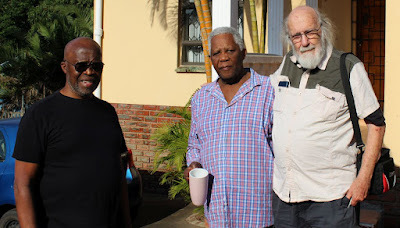 Owen & Theo Ngubane, Steve HayesSo we had something in common, but with a time lapse, so we compared notes. Owen said the buses he drove were fully automatic and could almost drive themselves. I drove RT buses with preselector gearboxes -- you selected the next gear you thought you were going to need, but it wouldn't actually change until you pressed the gear pedal with your left foot. A little later we got Routemaster buses, which had automatic gearboxes, but not very good ones, because they only changed at certain speeds. so late at night one would have to travel long distances slowly in a fuel-wasting low gear. because to change to a higher gear one would have to travel faster and so get ahead of schedule.
Owen & Theo Ngubane, Steve HayesSo we had something in common, but with a time lapse, so we compared notes. Owen said the buses he drove were fully automatic and could almost drive themselves. I drove RT buses with preselector gearboxes -- you selected the next gear you thought you were going to need, but it wouldn't actually change until you pressed the gear pedal with your left foot. A little later we got Routemaster buses, which had automatic gearboxes, but not very good ones, because they only changed at certain speeds. so late at night one would have to travel long distances slowly in a fuel-wasting low gear. because to change to a higher gear one would have to travel faster and so get ahead of schedule.The London we lived in was also very different. If anyone is interested in my reminiscences of the Swinging London of the 1960s, you can find them here.
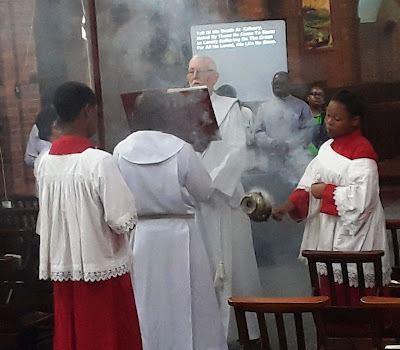 Deacon John Aitchison reading the Gospel, St John'sAfter breakfast we went to Durban to St John's Church in Clark Road. John Aitchison was serving as deacon, and they had 3 New Testament readings, one of which was St Peter's vision of clean and unclean foods, and John preached on that. They sung hymns to a piano accompaniment, and John read the Gospel from the middle of the church, surrounded by servers swinging incense.
Deacon John Aitchison reading the Gospel, St John'sAfter breakfast we went to Durban to St John's Church in Clark Road. John Aitchison was serving as deacon, and they had 3 New Testament readings, one of which was St Peter's vision of clean and unclean foods, and John preached on that. They sung hymns to a piano accompaniment, and John read the Gospel from the middle of the church, surrounded by servers swinging incense.Afterwards John told me something about the arrangement of the stained-glass windows, how they surrounded people with saints, the disciples of Jesus, his friends, and others. We asked the Rector, Themba Vundla, if we would use the chapel to sing the Hours and Obednitsa, and we read our own Gospel of the Samaritan Woman. There are not many Sundays after Pascha left when we can sing the Paschal hymns. so we did not want to miss this one.
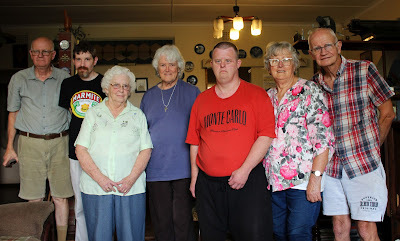 Gammage Family, Pinetown 19 May 2025On Monday 19 May we went up to Farningham Ridge to see Val's cousin Arthur Gammage, who was celebrating his 74th birthday. Arthur's younger brother Douglas and his wife Margie and their son Ken was also there, so it was a fair-sized family gathering, with Arthur's wife Jenny and their son Keith.
Gammage Family, Pinetown 19 May 2025On Monday 19 May we went up to Farningham Ridge to see Val's cousin Arthur Gammage, who was celebrating his 74th birthday. Arthur's younger brother Douglas and his wife Margie and their son Ken was also there, so it was a fair-sized family gathering, with Arthur's wife Jenny and their son Keith.They talked about their children and foster children and adopted children. Both families had adopted or fostered children with various disabilities, and Hilda, who had been adopted by Arthur and Jenny was now in a home, where she could be cared for.
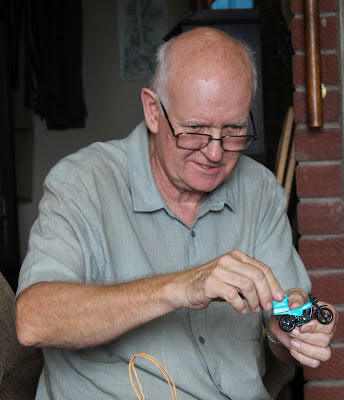 Arthur Gammage, 74th BirthdayDoug and Margie had adopted Hilda's brother Richard, who had even more problems than Hilda, and they said his behaviour would worsen at the time of the full moon. Nowadays many people seem to think that is a silly superstition, I had noticed that much the same thing had happened with someone I had worked and shared a house with 50 years ago. He could be very pleasant and affable sometimes, but then he would start getting fits of the sulks, and would do all kinds of petty spiteful things. I sometimes wondered if I was just imagining things, or perhaps was going mad -- more recently I discovered that this kind of behaviour is called "gaslighting" After a few months I noticed that his sulky phases seemed to coincide with the full moon. I don't know if Richard's behaviour was similar, but it did seem to be affected by the moon.
Arthur Gammage, 74th BirthdayDoug and Margie had adopted Hilda's brother Richard, who had even more problems than Hilda, and they said his behaviour would worsen at the time of the full moon. Nowadays many people seem to think that is a silly superstition, I had noticed that much the same thing had happened with someone I had worked and shared a house with 50 years ago. He could be very pleasant and affable sometimes, but then he would start getting fits of the sulks, and would do all kinds of petty spiteful things. I sometimes wondered if I was just imagining things, or perhaps was going mad -- more recently I discovered that this kind of behaviour is called "gaslighting" After a few months I noticed that his sulky phases seemed to coincide with the full moon. I don't know if Richard's behaviour was similar, but it did seem to be affected by the moon. After the birthday party we went to Durban North and again went to the Spur Steak Ranch for their pensioners' special. That particular branch of the Spur franchise was in the grounds of a sports club, and we parked next to an abandoned bowling green.
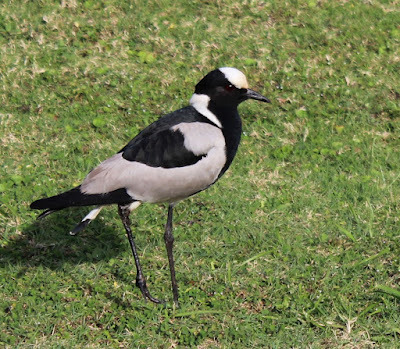 Blacksmith plover at Durban NorthThere we saw a blacksmith plover, like the ones we have in our garden at home. This one had a sore foot, and, perhaps because it was more difficult for it to run away, stood still and let me take a photo of it. It seems that several species of birds that used to be quite wild and rarely seen, and then only out in the country, are becoming urbanised and even domesticated. Hadedas became urbanised about 1990, and plovers and dik kops a few years later. At first it was crowned plovers we saw in our garden, but now the blacksmith plovers seem more common. The are called that because their cry sounds like a hammer hitting an anvil. There were also a couple of babies, and the one with the sore foot appeared to have a mate on the other side of the bowling green.
Blacksmith plover at Durban NorthThere we saw a blacksmith plover, like the ones we have in our garden at home. This one had a sore foot, and, perhaps because it was more difficult for it to run away, stood still and let me take a photo of it. It seems that several species of birds that used to be quite wild and rarely seen, and then only out in the country, are becoming urbanised and even domesticated. Hadedas became urbanised about 1990, and plovers and dik kops a few years later. At first it was crowned plovers we saw in our garden, but now the blacksmith plovers seem more common. The are called that because their cry sounds like a hammer hitting an anvil. There were also a couple of babies, and the one with the sore foot appeared to have a mate on the other side of the bowling green. We sat by the window overlooking a hockey field with astroturf, and some schoolkids were practising on it. Four schoolboys came in, aged about 11-13; two Indian, one coloured, one white, They sat at a table nearby, and we wondered how they had enough money to buy lunch at such a place. Maybe they were here after school to practise some sport, and their parents might have arranged for them to have lunch first.
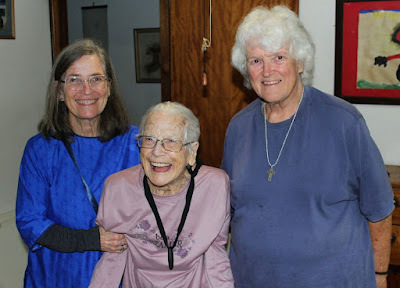 Nora Saneka, Noreen Ramsden, Val HayesWe went on to see Nora Saneka, now living in Roseglen with her widowed mother Noreen Ramsden. We had known the Ramsden family in Durban North in the 1970s, and it was good to see two of them again
Nora Saneka, Noreen Ramsden, Val HayesWe went on to see Nora Saneka, now living in Roseglen with her widowed mother Noreen Ramsden. We had known the Ramsden family in Durban North in the 1970s, and it was good to see two of them again They were having their fibre telephone cable repaired, as the municipality had cut the grass and cut the cable as well. Nora showed us photos of their family -- her husband Mike Saneka, who had died a couple of years ago after an operation for a cancer resulting from smoking too much. Her daughters Rebecca and Pascal, Pascal was a doctor, and specialised in trauma, and had gained a great deal of experience through the disasters that had struck Durban in recent years -- the Zuma riots, bringing in gunshot wounds; the floods, with drownings and so on. She said her brother Richard was in Sydney, Australia, where he was a kind of consultant, and he was the one member of the family that never seemed to be mentioned in our communications with them on Facebook.
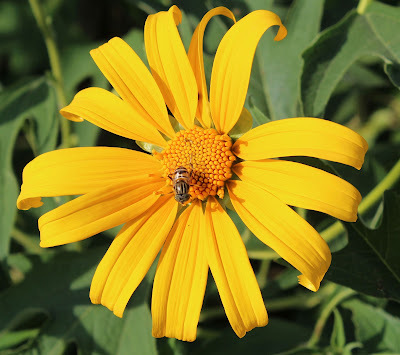 Mexican Sunflower?Her mother Noreen came in in a wheelchair, now in her 90s and suffering from Parkinson's disease, which made it difficult for her to talk. Her father, Bill Ramsden had died a few months ago, and had been disappointed that he would not last long enough to get a letter from King Charles on his 100th birthday, as he never made it that far, but tried to pretend he was older than he actually was. There was, however, a commendation from Queen Elizabeth hanging on thewall.
Mexican Sunflower?Her mother Noreen came in in a wheelchair, now in her 90s and suffering from Parkinson's disease, which made it difficult for her to talk. Her father, Bill Ramsden had died a few months ago, and had been disappointed that he would not last long enough to get a letter from King Charles on his 100th birthday, as he never made it that far, but tried to pretend he was older than he actually was. There was, however, a commendation from Queen Elizabeth hanging on thewall.Nora said she belonged to St Mary's Anglican parish in Greyville where she seemed to be quite active. She said the rectory had been sold to become a pizza parlour, and the adjacent shops were used by a group of businessmen who wanted to take over the church hall as well, but the parish had started a nursery school, which the businessmen seemed anxious to close. Nora was worried that the Archdeacon of Durban seemed to support the businessmen, as he thought the sale of the hall would bring in some money for the church. Nora argued that the church should use its buildings for the benefit of the community rather than just selling them off to raise funds.
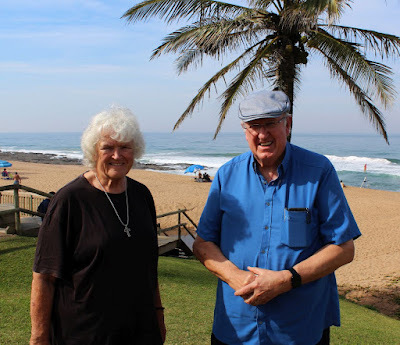 Val Hayes & Peter Gunning, Ballito BeachOn Tuesday 20th May we had breakfast with Theo and Owen Ngubane, and left Nagina at 9:15 am, to head up the North Coast and stopped nearby to take some photos of the ubiquitous yellow roadside flowers. They only seem to grow along roads with heavy traffic, so it's difficult to take photos of them. Carl Brook told us they were Mexican sunflowers and were an invasive alien species, but we thought they looked rather pretty and looked them up on the Web, and found that they are useful for fertilising the soil.
Val Hayes & Peter Gunning, Ballito BeachOn Tuesday 20th May we had breakfast with Theo and Owen Ngubane, and left Nagina at 9:15 am, to head up the North Coast and stopped nearby to take some photos of the ubiquitous yellow roadside flowers. They only seem to grow along roads with heavy traffic, so it's difficult to take photos of them. Carl Brook told us they were Mexican sunflowers and were an invasive alien species, but we thought they looked rather pretty and looked them up on the Web, and found that they are useful for fertilising the soil. We drove down to Umngeni and along Riverside Drive and up the old North Coast Road. We turned off at Casuarina Beach, where there had once been an old house we liked as we passed it when we lived in Melmoth and travelled to Durban back in the 1970s, but it had long been demolished, and modern ugly blocks of flats were being built in its place, and most of the Casuarina trees had vanished and we saw only a few palms.
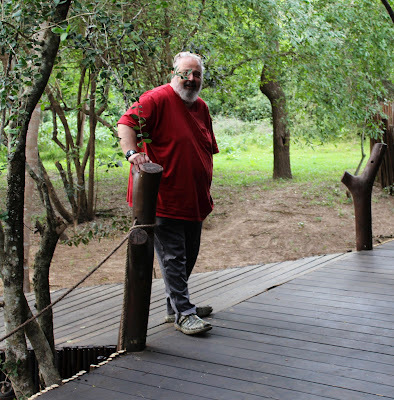 Melvain Donyes at iHlozi LodgeI went to a toilet there, but only the shell remained. It was full of rubbish, and all the fittings had been nicked. As we were leaving a bloke in a car stopped, and said it wasn't safe there; old people had been attacked, and we should rather go on to Westbrook Beach, which was further on.
Melvain Donyes at iHlozi LodgeI went to a toilet there, but only the shell remained. It was full of rubbish, and all the fittings had been nicked. As we were leaving a bloke in a car stopped, and said it wasn't safe there; old people had been attacked, and we should rather go on to Westbrook Beach, which was further on. We went on to Ballito, where we called on Peter Gunning, who took us to coffee at a beachside kiosk. We sat on a bench overlooking Ballito Beach and Pete spoke of Bible study groups he had participated in, some of which had old St Martin's people in them, including Alison Bastable, whom he said had wanted to see me, but we did not have her contact info. He talked about the millennialists in Bible study groups who waited for the end of the world, and were fans of Hal Lindsey's The Late Great Planet Earth. I wasn't aware that there were people who were still interested in that, and Pete said that they had changed the ending to put forward things that Hal Lindsey had predicted would happen, but hadn't happened as predicted, so they moved them further into the future.
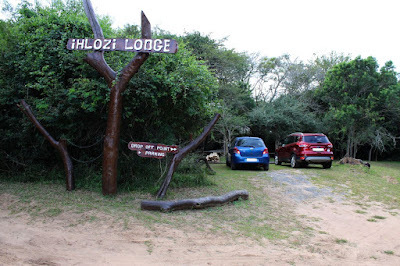 IHlozi Lodge. Kuleni Estate, near Hluhluwe, KZNWe went on our way up the coast, using the R102, and avoiding the N2 toll road, partly because of a conscientious objection to toll roads. In the past all roads had been paid for out of the Road Fund, which was replenished by the tax on petrol, which seemed a pretty fair "user pays" way of doing things, but the then National Party government wanted to rob the Road Fund for its attempted conquest of Angola, and so toll roads were introduced. Another reason for avoiding the toll roads was that they are full of big 26-wheeler trucks, which make driving unpleasant.
IHlozi Lodge. Kuleni Estate, near Hluhluwe, KZNWe went on our way up the coast, using the R102, and avoiding the N2 toll road, partly because of a conscientious objection to toll roads. In the past all roads had been paid for out of the Road Fund, which was replenished by the tax on petrol, which seemed a pretty fair "user pays" way of doing things, but the then National Party government wanted to rob the Road Fund for its attempted conquest of Angola, and so toll roads were introduced. Another reason for avoiding the toll roads was that they are full of big 26-wheeler trucks, which make driving unpleasant. Along the R102 at every settlement or village there were speed bumps in the road, often not well marked. But though the road makings had faded, you could often tell where they were because of the sugar cane that had bounced out of trucks as they went over them. The road was otherwise in good condition.
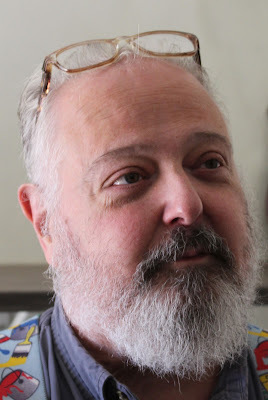 Melvain DonyesWe crossed the Tugela (uThukela) River on the old N2 bridge, which had been washed away in floods some years ago, so we had had to take a detour via Mandini when we travelled this way before, but the bridge had now been replaced. looking much as it had before, and from there to Empangeni the road was much as it had been 40 years ago when we lived in Melmoth and travelled down to Durban. Here it was the new toll road that was nearer to the coast.
Melvain DonyesWe crossed the Tugela (uThukela) River on the old N2 bridge, which had been washed away in floods some years ago, so we had had to take a detour via Mandini when we travelled this way before, but the bridge had now been replaced. looking much as it had before, and from there to Empangeni the road was much as it had been 40 years ago when we lived in Melmoth and travelled down to Durban. Here it was the new toll road that was nearer to the coast. We filled up with petrol for the third time on our trip at Mtubatuba. We drove on to Hluhluwe and reached Kuleni Estate at sundown. We went on to iHlozi Lodge, where our friends Melvain and Lynette Donyes welcomed us and we had supper with them and chatted. Melvain and Lynette had bought iHlozi Lodge out of their retirement savings and run it as a guest house to support them and their ministry as evangelist/teachers in the Pentecostal tradition. Melvain was one of the pioneers of online communications in South Africa, having set up one of the first BBSs and importing some Christian networks. One of the forums we started back then is still functioning, now as an email mailing list. It's called Offtopic, because it's a relaxed sort of place where you can discuss things that might be considered "off topic" in more specialised online forums. If you know us and would like to stay in touch, feel free to join us there -- you can find out more about it here. And if you're looking for a place to stay in northern Zululand near the coast, click here to find out more about iHlozi Lodge.And for more places to stay run by our family or friends, see here.
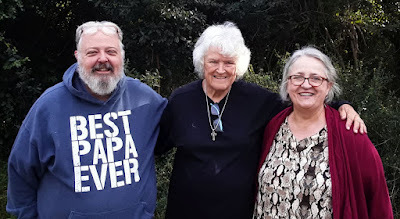 Melvain Donyes, Val Hayes, Lynette DonyesOn Wednesday 21 May we spent the day with Mel and Lynette, driving into the small town of Hluhluwe to have lunch at a small cafe there, and chatting about old times and old friends sitting around the fire in the evening.
Melvain Donyes, Val Hayes, Lynette DonyesOn Wednesday 21 May we spent the day with Mel and Lynette, driving into the small town of Hluhluwe to have lunch at a small cafe there, and chatting about old times and old friends sitting around the fire in the evening.On Thursday 22 May we said goodbye to Mel and Lynette and headed for home, and again had problems with poor road signage. Perhaps the roads authorities think that road signs are not needed because nowadays everyone listens to the plastic auntie giving directions on GPS, but we found that doesn't work too well, at least not on our cell phones. It shows you approaching a turnoff, but by the time is shows you have reached it, you've already passed it, so the signs would be useful. So we drove up the N2 for about 5 kilometres looking for the R69 to Vryheid, and had to turn back. It turned out to be a rough gravel road, but soon climbed into the hills with some spectacular views over the Pongola Dam.
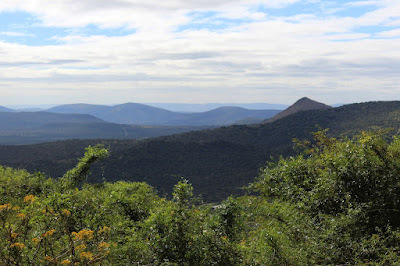 View from Magudu, KZNThen the map showed we had to join the R66 and travel 3 km south towards Nongoma before continuing along the R69. This time there was a sign, but it was actually a "short cut" and we should have carried on along the unmarked road. Eventually we saw a sign to a place that was on the map, the small village of Magudu, perched high on a hill, with splendid views in every direction -- well worth a visit.
View from Magudu, KZNThen the map showed we had to join the R66 and travel 3 km south towards Nongoma before continuing along the R69. This time there was a sign, but it was actually a "short cut" and we should have carried on along the unmarked road. Eventually we saw a sign to a place that was on the map, the small village of Magudu, perched high on a hill, with splendid views in every direction -- well worth a visit.And from there it was a zig-zag run (to avoid potholes) to Vryheid via Louwsburg (off the road and unseen) and Hlobane, a rather unromantic coal-mining town. Stopped for lunch at a Wimpy in Vryheid, and then on to Utrecht, where we had lived in 1976/77.
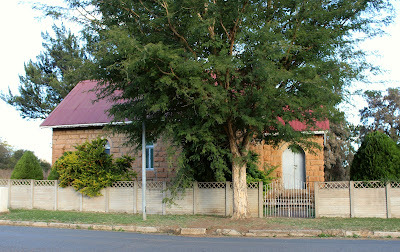 St Michael's Anglican Church, Utrecht, KZNThe small church of St Michael & All Angels, built by British soldiers during the Anglo-Boer War of 1899-1902, looked much the same as ever, but there was nothing to indicate what denomination it belonged to or the times of services. When we had been there there was an amazing carbon-filament light bulb in the entrance, which had probably lasted the 77 years since the church was built. Perhaps, after another 48 years, it is still working.
St Michael's Anglican Church, Utrecht, KZNThe small church of St Michael & All Angels, built by British soldiers during the Anglo-Boer War of 1899-1902, looked much the same as ever, but there was nothing to indicate what denomination it belonged to or the times of services. When we had been there there was an amazing carbon-filament light bulb in the entrance, which had probably lasted the 77 years since the church was built. Perhaps, after another 48 years, it is still working. We had a quick look around the town, which seemed little changed from nearly 50 years ago, before heading on home via Volksrust, Standerton and Leandra -- 710km in 13 hours, tired from avoiding potholes, for which Steve blames Maggie Thatcher, who started the mania for deregulation of road transport which has led to the deterioration of both the road and rail infrastructure. But hey, it was an enjoyable trip, and we saw a lot of old friends and met a few new ones.
June 4, 2025
Travels in the Free State and KZN, May 2025 (Part 2)
(Continued from Part 1)
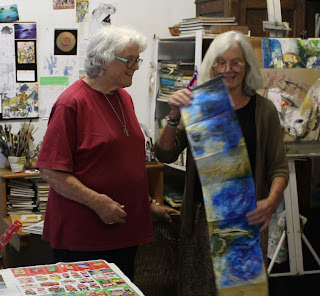 Val Hayes & Cath StempowskiOn Wednesday 14 May we had tea with Huberto and Cath Stempowski at Cowies Hill. We had met them at Clarens, where they had also gone for the memorial to Peter Walters.
Val Hayes & Cath StempowskiOn Wednesday 14 May we had tea with Huberto and Cath Stempowski at Cowies Hill. We had met them at Clarens, where they had also gone for the memorial to Peter Walters. Cath is an artist, and worked in various media, and showed us some of her pictures. She said she would be interested in playing with a possible illustration for the cover of the second edition of my children's book Of Wheels and Witches, which is being prepared for publication by Shack Simple Press in Texas, and she suggested some styles that could be used.
The story is about four children who have adventures in the Southern Drakensberg back in the time of apartheid, and spend some time riding around on horses, so the illustrations could show them on horseback or on foot, at any point in the story. Cath had one picture of a horse that suggested one possible style that could be used.
We drove down from Cowies Hill into Pinetown, and there found Sandy's Supermarket, which had been there forever. In the same shopping centre was a Spur Steak Restarant, so we had lunch there. We had their old folks special -- coffee; 124g steak with salad and chips, and ice cream, for R129.00, which was less than half the cost of the single course we had had at Granny Mouse's Country House the previous day.
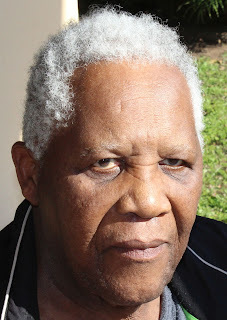 Revd Theophilus Ngubane
Revd Theophilus NgubaneBack to Theo Ngubane's place for supper, and more talking afterwards about old times together in the Anglican Diocese of Zululand in the 1970s and 1980s. Theo was amazed that Steve remembered the names of many people that he had forgotten, and said that most of those we had known had died. The only one left was Hamilton Mbatha, who had been Rector of KwaMagwaza Parish and rural dean of the Mthonjaneni Deanery when we had been there. Hamilton, Theo said, was still active in his retirement, and was often asked to preach in various places. Remembering names was easy because it was a close-knit community, and people often gathered at the diocesan conference centre at KwaMagaza. It was a place where we had many friends, and felt closer to people than in the big city. Once the burglar alarm went off at our neighbour's house in Kilner Park, in the Great City of Tshwane, and we phoned the neighbour to let him know, and he said he had moved away two years previously. Big cities are very anonymous places.
Perhaps one thing that has made it easier to remember people's names is that we had taken photos of many of them, and looked at the photos occasionally to remind ourselves of them.
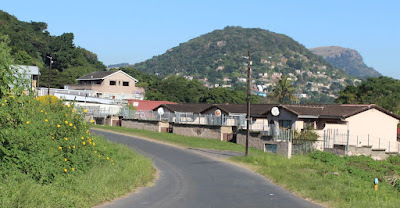 Nagina, near Pinetown, with yellow roadside flowersOn Wednesday Theo asked us to lead morning prayers, so we read the Hours of Pascha, with its repetitions of "Christ is Risen". After breakfast Theo took us in his son's car, a Yaris that was newer than ours, up to Maritzburg, up a back road from Nagina near Pinetown, where Theo lives, , the M61 West via Shongweni Dam, where we could see all the houses built on what until quite recently were bare hillsides. The hills were very steep, and there were lots of yellow flowers at the sides of the road, a bit like the orange zinnia-like ones in Gauteng, except that these were a bit more like daisies.
Nagina, near Pinetown, with yellow roadside flowersOn Wednesday Theo asked us to lead morning prayers, so we read the Hours of Pascha, with its repetitions of "Christ is Risen". After breakfast Theo took us in his son's car, a Yaris that was newer than ours, up to Maritzburg, up a back road from Nagina near Pinetown, where Theo lives, , the M61 West via Shongweni Dam, where we could see all the houses built on what until quite recently were bare hillsides. The hills were very steep, and there were lots of yellow flowers at the sides of the road, a bit like the orange zinnia-like ones in Gauteng, except that these were a bit more like daisies. At one place Theo pointed out sewage pipes coming out of houses and emptying into the gutter of the road, and said that people bribed the municipal inspectors for such things. Up at the top,just before joining the N3, there was a new shopping mall, Westown, a huge affair out in the veld, with access roads being built to it from Hillcrest and other places.
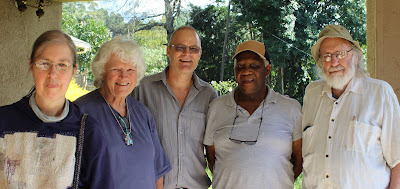 Macrina Walker, Val Hayes, Carl Brook, Theo & SteveFrom there we drove along the N3 to Hilton, and much of it being worked on, so it was reduced to 2 lanes, with the left lane being mostly occupied by 26-wheeler trucks. We went to Sweetwaters to see Carl Brook and his wife Elma. He is now head of ESSA (the Evangelical Seminary of South Africa). after having worked in Swaziland for a while. We had last seen them in 2008 when they were living down the South Coast. I had first met Carl online back in the 1990s and he was researching monastic and other intentional communities in southern Africa, and we had later met face-to-face a few times.
Macrina Walker, Val Hayes, Carl Brook, Theo & SteveFrom there we drove along the N3 to Hilton, and much of it being worked on, so it was reduced to 2 lanes, with the left lane being mostly occupied by 26-wheeler trucks. We went to Sweetwaters to see Carl Brook and his wife Elma. He is now head of ESSA (the Evangelical Seminary of South Africa). after having worked in Swaziland for a while. We had last seen them in 2008 when they were living down the South Coast. I had first met Carl online back in the 1990s and he was researching monastic and other intentional communities in southern Africa, and we had later met face-to-face a few times. 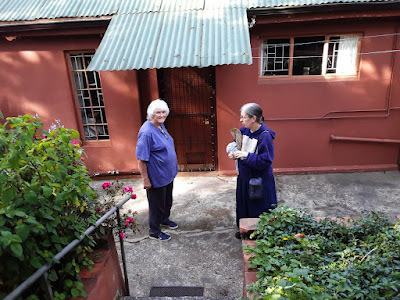 Val Hayes & Macrina Walker at Macrina's new cottage
Val Hayes & Macrina Walker at Macrina's new cottage After a while Macrina Walker, who lives just down the road, joined us, and we took her to lunch at a place called "The Upper Millstone" where they served sandwiches and coffee which for the four of us cost little more than lunch for one at Granny Mouse's Country House.
Macrina took my book of St John Chrysostom's Liturgy and said she would rebind it for me. She was looking for an apprentice of sorts to do that kind of work, as she is now mainly binding new books that she sells overseas, through her bookbinding service Annesi Bindings.
Macrina is another person we had first met online, when she was a Roman Catholic nun in the Netherlands, and thinking of becoming Orthodox.
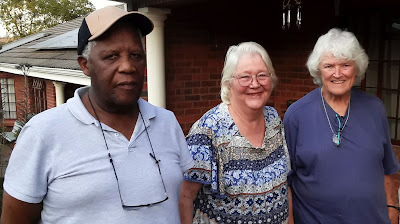 Theo Ngubane, Linelle Irvine, Val HayesWe went across to Hayfields to see Linelle Irvine, who had been at varsity with Steve back in the 1960s, and hadn't seen each other for nearly 60 years. She was living at the Lutheran Gardens Retirement Home, opposite the Lutheran Church. She had spent most of her working life as an English teacher.
Theo Ngubane, Linelle Irvine, Val HayesWe went across to Hayfields to see Linelle Irvine, who had been at varsity with Steve back in the 1960s, and hadn't seen each other for nearly 60 years. She was living at the Lutheran Gardens Retirement Home, opposite the Lutheran Church. She had spent most of her working life as an English teacher.We were very much having a "seeing people" holiday, visiting old friends and family that we hadn't seen for a long time, as many as said they would like to see us.
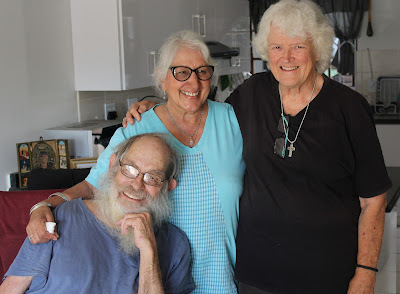 Darryl & Anne Honey, Val Hayes. Sarnia, 15 May 2025On Thursday 15 May we visited another old friend, Darryl Honey. He had been a neighbour of Steve at Culemborg Flats in Sandringham, Johannesburg, and later in Cheltondale. And we reminisced about old times and people we had known. We had found him on Facebook -- he was one of the people Facebook said we might know, as we had a mutual friend Tony MacGregor. Darryl said he had actually been friends with Tony's brother Chris MacGregor, through his interest in jazz, and said he had had a jazz guitar when he was younger, but when his bike was stolen his father had refused to get him a new one, and he had swapped his guitar for a bike. That is one of the main uses of social media web sites like Facebook -- they help you to re-establish contact with people you had lost touch with.
Darryl & Anne Honey, Val Hayes. Sarnia, 15 May 2025On Thursday 15 May we visited another old friend, Darryl Honey. He had been a neighbour of Steve at Culemborg Flats in Sandringham, Johannesburg, and later in Cheltondale. And we reminisced about old times and people we had known. We had found him on Facebook -- he was one of the people Facebook said we might know, as we had a mutual friend Tony MacGregor. Darryl said he had actually been friends with Tony's brother Chris MacGregor, through his interest in jazz, and said he had had a jazz guitar when he was younger, but when his bike was stolen his father had refused to get him a new one, and he had swapped his guitar for a bike. That is one of the main uses of social media web sites like Facebook -- they help you to re-establish contact with people you had lost touch with.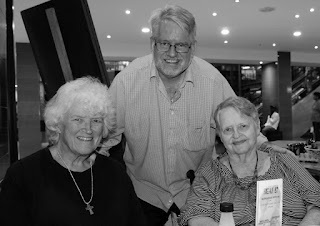 Val Hayes, Tim & Celia SparksIn that afternoon we had tea with more old friends, Celia Sparks and her son Tim. Steve had first met Celia when a mutual friend, Martin Goulding, had commandeered her garage to repair Steve's old car, a 1961 Peugeot 403 station wagon, which needed new main bearings, not a job which could be done out in the street.
Val Hayes, Tim & Celia SparksIn that afternoon we had tea with more old friends, Celia Sparks and her son Tim. Steve had first met Celia when a mutual friend, Martin Goulding, had commandeered her garage to repair Steve's old car, a 1961 Peugeot 403 station wagon, which needed new main bearings, not a job which could be done out in the street. Tim had been interested in Orthodoxy, and had visited a monastery near Pretoria. He is now a poet, and we talked mostly about books of Charles Williams.
On the Saturday we left Theo’s home in Nagina and went to the other side of Pinetown to visit Val's sister Elaine and her family.
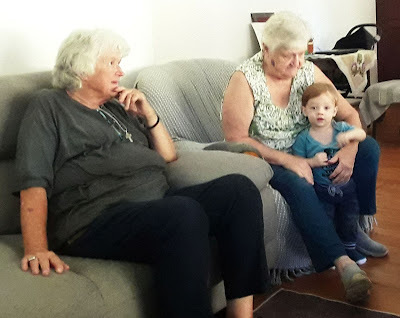 Val Hayes, Elaine Machin, Wyatt AndersonThey have an interesting family arrangement as Val's niece Lesley and her husband Jay have a house with a small second house on the premises and their mothers live together there. This gives security to the ladies and also provides for baby-sitting for their mutual grandchild Wyatt, who certainly does not suffer from the lack of love and attention from two grannies.
Val Hayes, Elaine Machin, Wyatt AndersonThey have an interesting family arrangement as Val's niece Lesley and her husband Jay have a house with a small second house on the premises and their mothers live together there. This gives security to the ladies and also provides for baby-sitting for their mutual grandchild Wyatt, who certainly does not suffer from the lack of love and attention from two grannies.Elaine has not been well for the past few months, and also had a very bad fall which left her face bruised and cut . I had been very concerned for her, but was happy to see that she is well and recovering. She is very artistic and I encouraged her to pick up her paints again and spend time doing something she really enjoys.
They spoiled us with lovely tea/lunch and it was great to catch up on so many years since we were last together (13 years). Wyatt is a beautiful, active, enquiring little boy.
 Wyatt and his other granny, Averil Anderson
Wyatt and his other granny, Averil Anderson(to be continued)
May 30, 2025
Travels in the Free State and KZN, May 2025 (Part 1)
In May 2025 we went on a holiday trip to the Free State and KZN, the first time we had been outside Gauteng for ten years. In 2015 we went to the Northern and Western Cape, which you can read about here, if you are interested. This is a kind of travelogue, people and places we saw in our travels.
This time our journey was initially sparked off by family concerns. A cousin of mine, Peter Walters (alias Peter Badcock-Walters) died a year ago, and we went to Clarens in the Free State to have a memorial gathering on the anniversary of his death. Its a route we have taken a few times before -- from Kilner Park in the Great City of Tshwane we head south-east down the R50 to Delmas, which the road by-passes, and from there to Devon, Balfour, Villiers, Frankfort, Bethlehem and finally to Clarens.
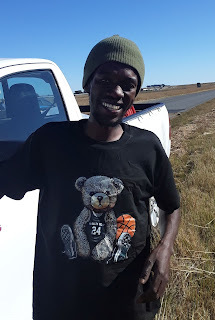 Sibusiso Gama - a kind young manBut, we find, the Province of Mpumalanga doesn't do road signs. The turn-off to Devon is not marked, and we can't remember it from the last time we passed this way 12 years ago. I tried to check the Google maps on my cell phone, but didn't know how to work it properly and trying to type something in while bouncing along avoiding potholes was too difficult. So we continued on to Leandra, formerly known as Leslie and now called something else, and took the road to Devon from there. A few kilometres on, we hit an enormous pothole. Val was driving, and with a 26-wheeler truck coming the other way, there was nowhere to swerve to, and bang there was a flat tyre. We stopped at the first place where it was possible to get off the road, and had to remove all the luggage to get at the spare wheel, and fumble under the passenger seat to find the jack, and we had just started to jack up the car when a very kind young man, Sibusiso Gama, stopped to help us. One thing we have found is that if you have car trouble, people are generally kind and stop to help. The road from Balfour to Villiers had many more potholes, and we very drove slowly as another flat tyre would mean we'd be stuck.
Sibusiso Gama - a kind young manBut, we find, the Province of Mpumalanga doesn't do road signs. The turn-off to Devon is not marked, and we can't remember it from the last time we passed this way 12 years ago. I tried to check the Google maps on my cell phone, but didn't know how to work it properly and trying to type something in while bouncing along avoiding potholes was too difficult. So we continued on to Leandra, formerly known as Leslie and now called something else, and took the road to Devon from there. A few kilometres on, we hit an enormous pothole. Val was driving, and with a 26-wheeler truck coming the other way, there was nowhere to swerve to, and bang there was a flat tyre. We stopped at the first place where it was possible to get off the road, and had to remove all the luggage to get at the spare wheel, and fumble under the passenger seat to find the jack, and we had just started to jack up the car when a very kind young man, Sibusiso Gama, stopped to help us. One thing we have found is that if you have car trouble, people are generally kind and stop to help. The road from Balfour to Villiers had many more potholes, and we very drove slowly as another flat tyre would mean we'd be stuck. Villiers looked a bit like a ghost town, since the highway now by-passes it, but the volume of traffic can barely manage the toll plaza, and the single-lane bridge into Villiers would never cope. The Vaal River at Villiers looked pretty, so we took some photos.
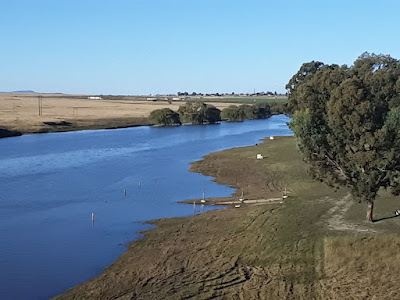 The Vaal River at Villiers
The Vaal River at VilliersWe made it to Clarens without any further problems. Peter Walters and his wife Toni ran a guest house, Clarens Country House which they had converted from an old cow shed. Peter & Toni's son Craig returned from Greece to help Toni run the guest house after Peter's death, and their other son, Ross, came up from KwaZulu-Natal with his wife Susie and son Tom for the gathering.
The next morning we drove back to Bethlehem to get the flat tyre seen to. It turned out that there was nothing wrong with the tyre, but they couldn't mend the wheel, and got a second-hand one from somewhere, and as a result we now have two mismatched front wheels. Farming communities are very good at fixing things.
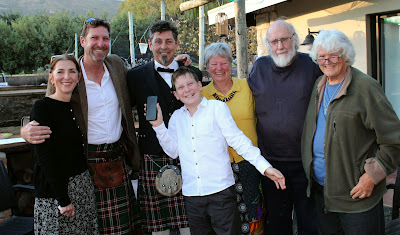 Susie, Ross, Craig & Toni Walters, Steve & Val Hayes At the memorial gathering itself, Peter's friends came, and there were about 30 people there. Several shared their memories of Pete. He was an artist and book illustrator. He did the illustrations for an edition of the work of Herman Charles Bosman, He was also an educational reformer, and gave a lot of time to educational reform in South Africa. We concluded with the shortest and simplest form of the Orthodox Memorial Service (with the blessing of our parish priest, Fr Danil). This is usually done on the anniversary of a person's death, or the closest Saturday to it.
Susie, Ross, Craig & Toni Walters, Steve & Val Hayes At the memorial gathering itself, Peter's friends came, and there were about 30 people there. Several shared their memories of Pete. He was an artist and book illustrator. He did the illustrations for an edition of the work of Herman Charles Bosman, He was also an educational reformer, and gave a lot of time to educational reform in South Africa. We concluded with the shortest and simplest form of the Orthodox Memorial Service (with the blessing of our parish priest, Fr Danil). This is usually done on the anniversary of a person's death, or the closest Saturday to it.
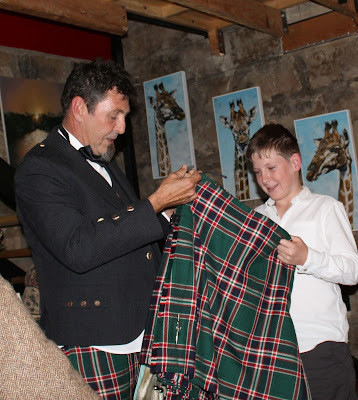 Craig Walters presents Tom with his granddad's kiltThis was followed by a buffet supper at which Craig passed on to young Tom his grandfather's kilt in the MacFarlane tartan (Peter's and my great-grandmother was Ellen MacFarlane (1858-1933), from Glasgow). On Sunday morning we sang the Hours and Obednitsa with Toni and Craig, and Craig, who had heard Orthodox services in Greek, quite enjoyed hearing it in English.
Craig Walters presents Tom with his granddad's kiltThis was followed by a buffet supper at which Craig passed on to young Tom his grandfather's kilt in the MacFarlane tartan (Peter's and my great-grandmother was Ellen MacFarlane (1858-1933), from Glasgow). On Sunday morning we sang the Hours and Obednitsa with Toni and Craig, and Craig, who had heard Orthodox services in Greek, quite enjoyed hearing it in English.On Monday 12 May we left Clarens for KwaZulu-Natal. Last time we passed this way the Oliviershoek Pass over the Drakensberg was said to be impassible, so we had avoided it. This time we were just told it was bad, with detours and wash-aways, but it was much better than we expected, and we enjoyed the autumn colours of the trees along the route, especially in Winterton. We avoided the toll roads as far as possible, driving through Estcourt, Mooi River and Nottingham Road. Beyond Balgowan we saw a sign saying that Granny Mouse's Country House was open for lunch, so we went in. I expected a thatched cottage surrounded by hollyhocks with a few tables and maybe tea and cream scones. It turned out to be a rather large hotel, with a very expensive, though tasty, curry lunch. It cost over R600 for the two of us.
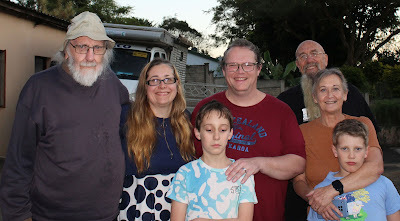 Jacelyn & Hannes Zwart, Gary & Cheryldene van SchoorOn leaving there we stopped to take photos of the Lidgeton Falls on Lions River, then bypassed Pietermaritzburg, and visited another cousin, Cheryldene van Schoor (nee Bradbury). I had not met her before, and had last seen her father, Michael Bradbury, when I was 7 and he was 12, in Ingogo, so it was good to meet his children, grandchildren and great grandchildren!
Jacelyn & Hannes Zwart, Gary & Cheryldene van SchoorOn leaving there we stopped to take photos of the Lidgeton Falls on Lions River, then bypassed Pietermaritzburg, and visited another cousin, Cheryldene van Schoor (nee Bradbury). I had not met her before, and had last seen her father, Michael Bradbury, when I was 7 and he was 12, in Ingogo, so it was good to meet his children, grandchildren and great grandchildren! We went on to Pinetown, and drove past Mariannhill through an endless traffic jam going down the hill to Nagina, where we stayed with an old friend, Theophilus Ngubane. Forty-five years ago we had worked together in the Anglican Diocese of Zululand, training self-supporting priests and deacons. We sat around talking until 1:00am catching up on news from the past.
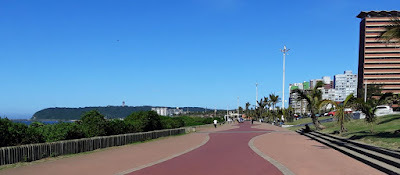 Addington Beach, Durban. 13 May 2025
Addington Beach, Durban. 13 May 2025The next morning Theo insisted that the first thing we must do in Durban after not having been there for a long time was go to the beach, and so he took us on a tour through some of the southern suburbs. Seeing it in daylight we were immediately struck by the proliferation of yellow flowers at the side of the road. We had never seen such flowers in Durban before (our last visit was in 2012). They grew on quite tall plants. But about a month ago we were struck by similar plants in the Great City of Tshwane, but there the flowers had been orange.
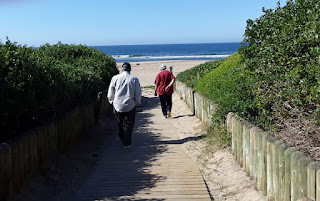 Addington Beach, replanted with coastal bushTheo took us to Addington Beach, which had been done up since we had last seen it, and one noticeable improvement was that someone, presumably the eThekwini Municipality had restored the indigenous coastal bush along the edge of the beach, which helped to stop beach erosion. This also gave the feel that you used to get along the coast of walking the narrow path through the bush, and encountering the beach and the sea. Another interesting observation was that I follow a couple of Facebook groups where people post historical pictures of old Durban, and there are usually numerous comments from white racists about how nice and clean Durban and its beaches were in the "good" old days of apartheid, and how filthy and rubbish clogged the place is now. But we could see no sign of the alleged filth and rubbish, and it all looked clean and well maintained to us.
Addington Beach, replanted with coastal bushTheo took us to Addington Beach, which had been done up since we had last seen it, and one noticeable improvement was that someone, presumably the eThekwini Municipality had restored the indigenous coastal bush along the edge of the beach, which helped to stop beach erosion. This also gave the feel that you used to get along the coast of walking the narrow path through the bush, and encountering the beach and the sea. Another interesting observation was that I follow a couple of Facebook groups where people post historical pictures of old Durban, and there are usually numerous comments from white racists about how nice and clean Durban and its beaches were in the "good" old days of apartheid, and how filthy and rubbish clogged the place is now. But we could see no sign of the alleged filth and rubbish, and it all looked clean and well maintained to us.
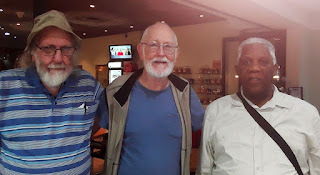 Steve Hayes, John Aitchison, Theophilus NgubaneTheo took us to the King Shaka Ocean World, which again was new to us. We had lunch at Macdonalds, where they no longer had printed menus. and you were expected to order through a phone app. None of us had the app, or any room on our phones for it, so the black waitress pressed buttons on a big screen, and was a bit taken aback to discover that Theo was buying lunch for his white friends.
Steve Hayes, John Aitchison, Theophilus NgubaneTheo took us to the King Shaka Ocean World, which again was new to us. We had lunch at Macdonalds, where they no longer had printed menus. and you were expected to order through a phone app. None of us had the app, or any room on our phones for it, so the black waitress pressed buttons on a big screen, and was a bit taken aback to discover that Theo was buying lunch for his white friends. We went on for afternoon tea at the Windermere Centre, where we had afternoon tea with another old friend, John Aitchison, who had been at university with Steve in Pietermaritzburg, and we has worked together on Theological Education by Extension (TEE).
(To be continued in Part 2)
May 3, 2025
The Adventures of Skew
As a child, I loved this book, and read it several times. It is a fairly short book, with two stories. The Adventures of Skew is about a china horse who longs to be a real horse, and one day hls fairy godmother comes and tells him that he will be allowed to be a real horse one day of the month, at the new moon, and if he is good enough he might be allowed to be real permanently.
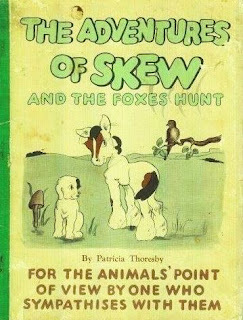 The Foxes Hunt is about a family of foxes who are tired of being hunted and make plans so that the next time they are hunted they can turn around and hunt the hounds.
The Foxes Hunt is about a family of foxes who are tired of being hunted and make plans so that the next time they are hunted they can turn around and hunt the hounds. It seems to be a fairly rare book -- it doesn't seem to appear in the GoodReads catalogue. I inherited it because my father was a chemist, and had a chemist friend, Bill Buchanan, who worked at Klipfonein Organic Products near the Modderfontein dynamite factory. The name sounds rather ironic nowadays, because some people speak as though "organic" products means they have no "chemicals", but the products of Klipfontein Organic Products were mostly poisonous -- insecticides and the like. One of them was Bexadust, which we used for killing ticks on our horses, which is perhaps appropriate in a story sparked off by a story about a horse.
But, sadly, Bill Buchanan died, and they were living in a company house on the grounds of Klipfontein Organic Products (KOP) and the house was needed for Bill's replacement. So Bill's widow and children came to stay with us until they could find a place to live.
Alan, the older child was 15 and at boarding school (Michaelhouse in Natal), so I only saw him during school holidays. Rosemary, the younger child, was 13, and rather pretty, I thought, but I was only 8.
Rosemary brought The Adventures of Skew, and when they left after a few weeks she left some of the books behind, presumably because she was too old for them. I remember one of the others, which has since been lost, which was called Tick Tock and was about a Professor Postlethwaite who had an underground laboratory that controlled the seasons, and woke up the bulbs when it was time for them to flower, and sent spiderlings away on gossamer parachutes when they hatched. This one was even rarer than the Skew book, and no search engine seems to be able to find it.
Grace Buchanan and her children eventually went to live in Pietermaritzburg, in Jesmond Road, Scottsville, next to the golf course, where we visited them when travelling to Durban. Grace Buchanan was later the lady warden of the women's residence of the Natal Teachers Training College. Rosemary married someone called Sutton.



